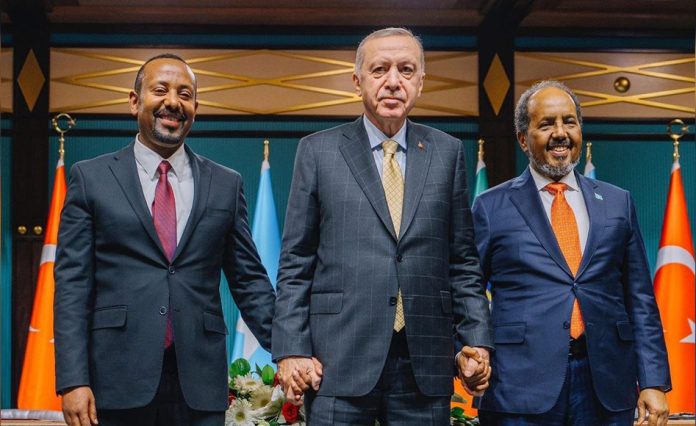Facebook Twitter (X) Instagram Somali Magazine - People's Magazine
Talks in Addis Ababa focus on diplomatic reconciliation, security cooperation, and Ethiopia’s bid for maritime access through Somalia
Addis Ababa (HOL) — Somali President Hassan Sheikh Mohamud and Ethiopian Prime Minister Abiy Ahmed met on Friday during the 38th African Union (AU) Summit in Addis Ababa. This was their first meeting since signing the Ankara Declaration in December 2024, which helped reduce tensions after a year of disagreements between the two countries.
The discussions focused on rebuilding diplomatic ties, improving security cooperation, and Ethiopia’s request for access to the sea through Somalia. Earlier in 2024, Ethiopia signed an agreement with Somaliland to use 20 kilometers of coastline for a naval base in exchange for possibly recognizing Somaliland’s independence.
Somalia strongly opposed this agreement because it sees Somaliland as part of its country. In response, Somalia cut diplomatic ties with Ethiopia, recalled its ambassador, and threatened to remove Ethiopian troops from Somalia.
Turkey stepped in to help resolve the issue, leading to the Ankara Declaration on December 11, 2024. This agreement helped calm tensions and created a plan for future talks. Ethiopia agreed to negotiate with Somalia for commercial sea access instead of using the Somaliland agreement. In January 2025, the two countries restored diplomatic relations, making further discussions possible.
One of the key topics in Addis Ababa was the future of Ethiopian troops in Somalia. Earlier, Somalia had threatened to remove these troops, seeing their presence as a violation of its sovereignty. Ethiopia has kept around 10,000 soldiers in Somalia as part of the African Union’s mission to fight al-Shabaab. Ethiopia now wants to continue its military presence under a new mission called AUSSOM.
Deputy Foreign Minister Ali Omar ‘Balcad’ said Somalia is working to include Ethiopia in AUSSOM, but most troop positions have already been assigned. A Somali team will visit Ethiopia to discuss the number of troops and how they will operate while respecting Somalia’s sovereignty.
Another important topic was Ethiopia’s need for sea access. Ethiopia currently depends on Djibouti for almost all of its imports and exports. Ethiopia wants more options and sees Somali ports as a solution. However, Somalia is cautious because it does not want to risk losing control over its coastal areas.
The ports of Mogadishu and Kismayo are being considered for Ethiopian trade, but many challenges exist. One major problem is security. Al-Shabaab controls or threatens key roads that connect Ethiopia to Somali ports, making trade routes unsafe.
Despite progress in talks, security remains a big concern. Al-Shabaab continues to carry out attacks, trying to weaken the government and disrupt peace efforts. Somalia also faces political challenges, with opposition groups worrying that any deal with Ethiopia might harm the country’s sovereignty.
Although the meeting in Addis Ababa was an important step toward better relations, many issues remain. Ethiopia has not officially canceled its agreement with Somaliland, leading to concerns in Somalia that Ethiopia may still be following a two-sided approach.
The coming months will be crucial as both countries work to improve their relationship while dealing with security, economic, and political challenges

